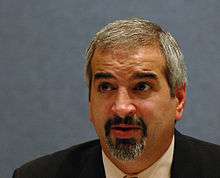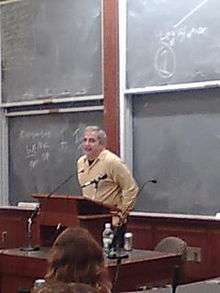Anthony Shadid
Anthony Shadid (September 26, 1968 – February 16, 2012) was a foreign correspondent for The New York Times based in Baghdad and Beirut who won the Pulitzer Prize for International Reporting twice, in 2004 and 2010.[1][2]
Anthony Shadid | |
|---|---|
 Shadid at the National Press Club in 2007 | |
| Born | Anthony Shadid September 26, 1968 Oklahoma City, Oklahoma, U.S. |
| Died | February 16, 2012 (aged 43) |
| Alma mater | University of Wisconsin–Madison (1990) |
| Occupation | Journalist |
| Employer | The New York Times |
| Known for | Pulitzer Prize winner |
| Spouse(s) | Nada Bakri ( m. 2009–2012) |
| Children | 2 |
| Awards | Pulitzer Prize for International Reporting, in 2004 and 2010 |
Background
Anthony Shadid was born on September 26, 1968, in Oklahoma City, Oklahoma, of Lebanese Christian descent. In 1990, he graduated from the University of Wisconsin–Madison,[3][4] where he wrote for The Daily Cardinal student newspaper.[5]
Career
From 2003 to 2009 Shadid was a staff writer for The Washington Post where he was an Islamic affairs correspondent based in the Middle East. He previously worked as Middle East correspondent for the Associated Press based in Cairo and as news editor of the AP bureau in Los Angeles. He spent two years covering diplomacy and the State Department for The Boston Globe before joining the Post's foreign desk.[6][7]
In 2002, he was shot in the shoulder by an Israel sniper in Ramallah[8] while reporting for the Boston Globe in the West Bank. The bullet also grazed his spine.[9][10]
On March 16, 2011, Shadid and three colleagues were reported missing in Eastern Libya, having gone there to report on the uprising against the dictatorship of Col. Muammar Al-Ghaddafi.[11] On March 18, 2011, The New York Times reported that Libya agreed to free him and three colleagues: Stephen Farrell, Lynsey Addario and Tyler Hicks.[12] The Libyan government released the four journalists on March 21, 2011.[13]

Personal life and death
Shadid married Nada Bakri, also a reporter for The New York Times; they had a son, Malik.[14] Shadid had a daughter, Laila, from his first marriage.[15]
Michael Shadid was his great uncle.
Shadid died at age 43 on February 16, 2012, from a "fatal asthma attack" while attempting to leave Syria.[14][16][17] Shadid's smoking and extreme allergy to horses are believed to be the major contributing factors in causing his fatal asthma attack.[17] His body was carried to Turkey by Tyler Hicks, a photographer for The New York Times.[2][18]
Shadid's cousin, Dr. Edward Shadid of Oklahoma City, challenged the Times' version of the death, and instead blamed the publication for forcing him into Syria.[2][19]
Awards
- 2003: George Polk Award for Foreign Reporting
- 2004:
- Michael Kelly Award
- Overseas Press Club award
- American Society of Newspaper Editors award
- Pulitzer Prize for International Reporting (2004)
- 2006: Ridenhour Book Prize for Night Draws Near
- 2010: Pulitzer Prize for International Reporting (2010)[16]
- 2011: Honorary Doctorate of Humane Letters from the American University of Beirut[20]
- 2012:
- George Polk Award for Foreign Reporting[21]
- Finalist for National Book Award (Nonfiction) and National Book Critics Circle Award (Autobiography) for House of Stone[22][23]
Works
Shadid's experiences in Iraq formed the subject for his 2005 book Night Draws Near, an empathetic look at how the war has impacted the Iraqi people beyond liberation and insurgency.
- Legacy of the Prophet: Despots, Democrats, and the New Politics of Islam (Westview Press, 2002)
- Night Draws Near: Iraq's People in the Shadow of America's War (New York: Henry Holt and Company, 2005)[24]
- Dove la notte non finisce (Piemme, 2006)
- House of Stone (New York: Houghton Mifflin Harcourt, 2012)
References
- Shadid, Anthony (January 11, 2010). "Allah – the Word". The New York Times.
- "Anthony Shadid, Reporter in the Middle East, Dies at 43" by Margalit Fox. The New York Times, February 16, 2012. Retrieved February 17, 2012.
- Anthony Shadid: Biography from the Pulitzer Prize website
- Forster, Stacy (12 April 2010). "UW-Madison graduate Anthony Shadid wins Pulitzer Prize". University of Wisconsin–Madison News.
- Bauter, Alison (April 9, 2012). "Remembering Anthony Shadid, 1968-2012". The Daily Cardinal. Retrieved January 29, 2013.
- The Washington Post staff page Archived August 22, 2006, at the Wayback Machine
- "Anthony Shadid". The Daily Telegraph. London. February 17, 2012.
- Anthony Shadid, House of Stone: A Memoir of Home, Family, and a Lost Middle East, Houghton Mifflin Harcourt, 2012 p.7: 'I was shot by an Israeli sniper in Ramallah.'
- Myre, Greg (March 31, 2002). "Reporter wounded by gunshot: Israel asks journalists to leave Ramallah". The Boston Globe. Associated Press. Retrieved April 8, 2012.
- "Anthony Shadid: Questions a Reporter Asks Himself (see 41:50 for Anthony Shadid quote)". Radio Open Source. April 23, 2010. Retrieved April 8, 2012.
- "Former Globe reporter missing in Libya". Boston Globe. March 16, 2011. Archived from the original on November 3, 2012. Retrieved April 8, 2012.
- Kirkpatrick, David (March 18, 2011). "Libya Says It Will Release Times Journalists". The New York Times. Retrieved March 18, 2011.
- Peters, Jeremy W. (March 21, 2011). "Freed Times Journalists Give Account of Captivity". The New York Times. Retrieved April 3, 2011.
- Bakri, Nada (August 3, 2019). "What the Arab Spring Cost Me". New York Times. Retrieved August 3, 2019.
- "Family in Seattle recalls foreign correspondent Anthony Shadid's empathy" Archived January 29, 2013, at Archive.today The Sacramento Bee, February 19, 2012.
- The Pulitzer Prize Archived September 8, 2006, at the Wayback Machine
- The Atlantic, The Things That Anthony Shadid Taught Me February 17, 2012 Retrieved March 4, 2012.
- ”"Anthony Shadid, Reporter in the Middle East, Dies at 43" by Rick Gladstone. The New York Times, February 16, 2012. Retrieved February 17, 2012.
- Weir, Alison (June 29, 2012). "Did The New York Times Lead Anthony Shadid to His Death?". Counterpunch. Retrieved June 12, 2016.
- "Honorary Doctorates: Anthony Shadid". American University of Beirut. 2011. Archived from the original on June 8, 2012. Retrieved April 8, 2012.
- "Polk Awards will honor Anthony Shadid". BusinessWeek. February 17, 2012. Retrieved April 8, 2012.
- "National Book Award Finalists Announced Today". Library Journal. October 10, 2012. Archived from the original on December 6, 2012. Retrieved November 15, 2012.
- John Williams (January 14, 2012). "National Book Critics Circle Names 2012 Award Finalists". The New York Times. Retrieved January 15, 2013.
- Caryl, Christian (January 11, 2007). "What About the Iraqis?". New York Review of Books. Retrieved November 11, 2018.
External links
- Official website
- "Anthony Shadid collected news and commentary". The New York Times.
- Pulitzer Prize winning work at The Washington Post
- Anthony Shadid 1968–2012, pieces written for the Associated Press
- Appearances on C-SPAN
- Anthony Shadid on Charlie Rose
- Works by or about Anthony Shadid in libraries (WorldCat catalog)
- Pulitzer Prize for International Reporting in 2004 and 2010 – citation, works, biography, jury
- David Chambers, "Calling Helen Thomas", Saudi Aramco World, March/April 2006 – feature article profiling Anthony Shadid, Newsweek's Lorraine Ali and NBC's Hoda Kotb
- Amy Goodman, Anthony Shadid: Tunisia Has "Electrified People Across the Arab World", Democracy Now!, January 18, 2011 – video report
- Terry Gross, "A Foreign Correspondent Reflects On The Arab Spring", Fresh Air, December 21, 2011 – interview with Anthony Shadid